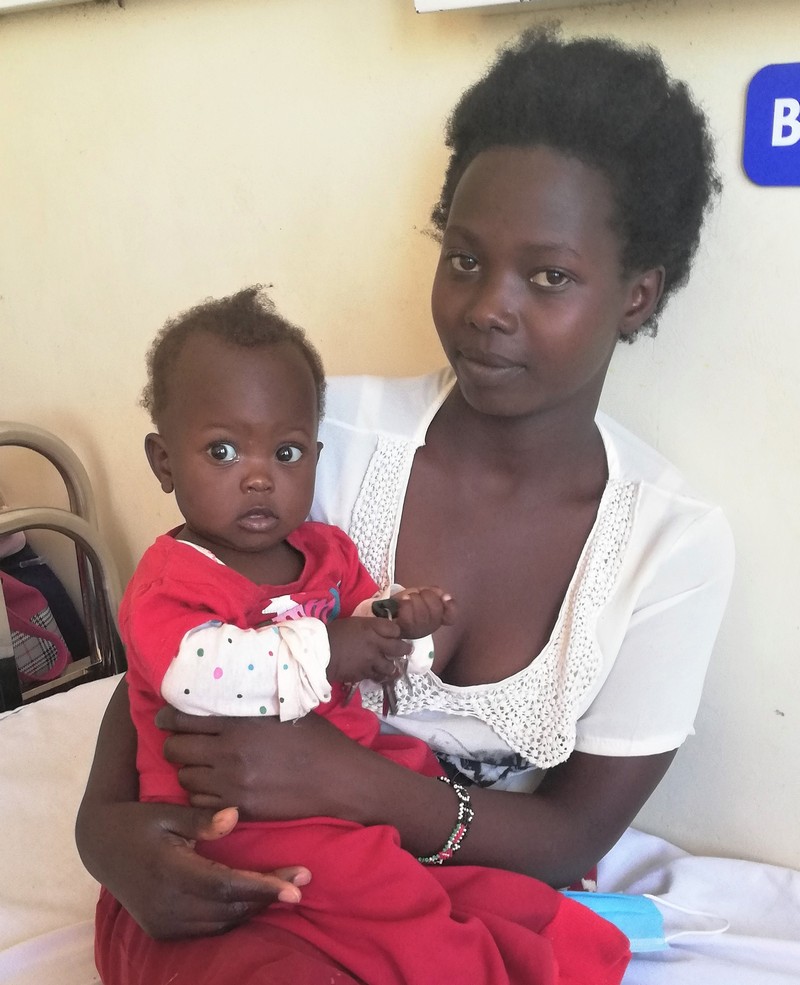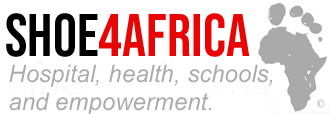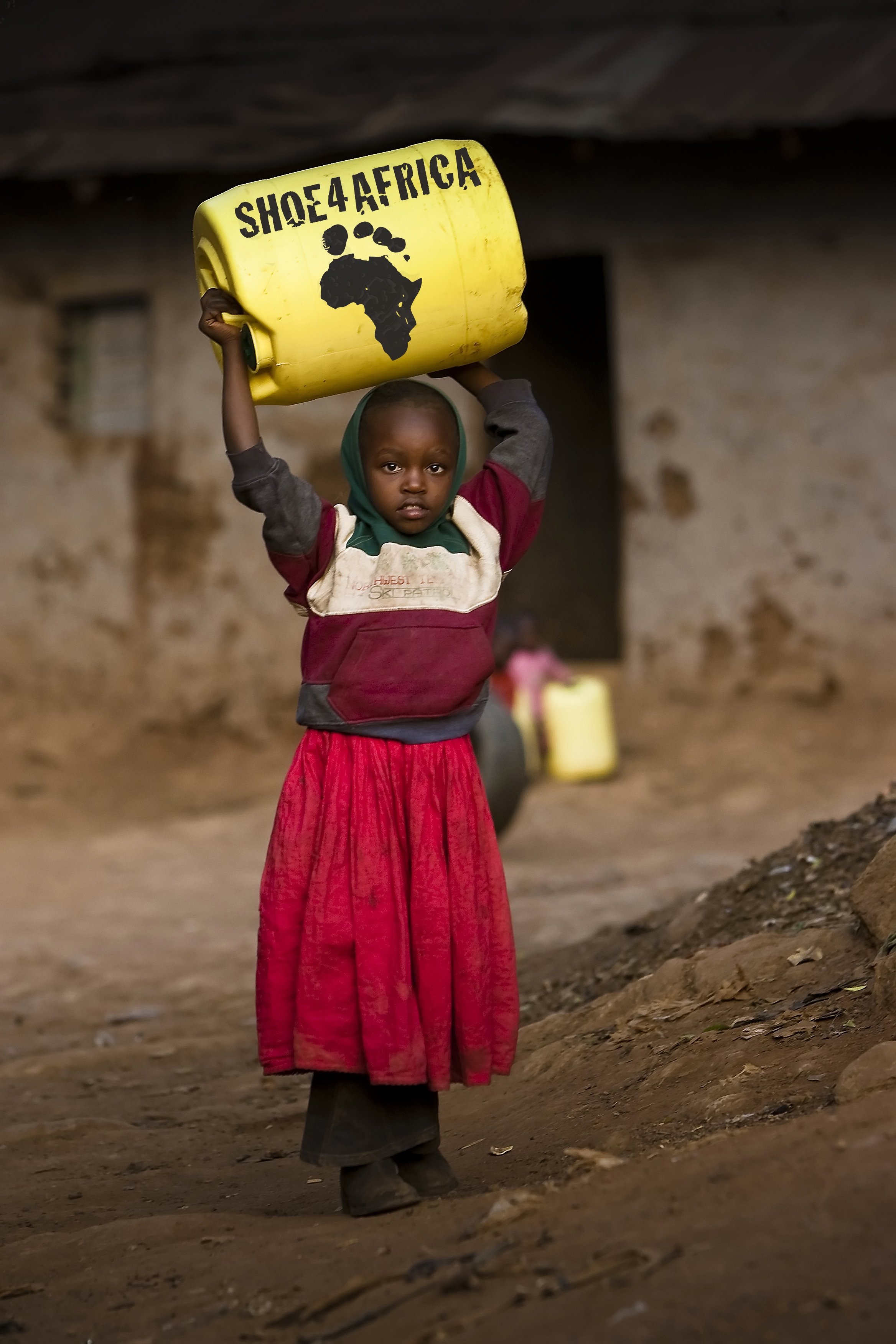Kimurgor Preston’s story,
“There is nothing as grueling as bouncing from place to place in search of a home – a place where one does not struggle to be accepted. Sometimes, however, this is some people’s reality. Preston, a 6-year-old boy, unfortunately, is one such person. Along with his 7 siblings and mom, Preston’s childhood for a long time constituted moving from one home to another in search of acceptance, especially by their father and extended family.
About 2 years ago, his father and family finally gave up the crusade against them, following their grandmother’s demise. According to Preston’s mom, Tecla, she, and her kids struggled with having an actual home because of her HIV status. She was infected many years back, in 2004, before she married into this family. She was raped by her employer, whom she worked for as a housemaid. Attempting to explain how it happened, Tecla stated that he drugged her. She remembers him getting home and offering her a drink. The next memory is of her waking up naked. Her journey to healing without professional intervention, into marriage, and many years later finding out about her status is a completely wild wind.
Anyway, Preston has spent the last two years at his paternal home, which in the African community, is how marriage and residence work. That is, once a woman marries, they move to their husband’s home where they cooperate with the rest of the women in that household. Their children also inherit from this home and take up roles within it. So, you see, Preston and his siblings living outside of this home was essentially an abomination. Thankfully, after the passing away of their grandma, some semblance of acceptance was reclaimed, opening up space for them to go back home. Today, they live happily with the rest of the family. Indeed, as they say, time heals everything.
Nevertheless, this has not taken from their financial and social situation. The family still lives in replete poverty. Worse, even. Tecla and her kids have to collect firewood to sell for food. In the dead of night, she and all the kids wake up and walk into a nearby government-owned forest to collect firewood. With the tight forest security, it is always a risk going out to collect during the day. While there is always the risk of encountering dangerous people inside the forest at night, that is a much better consequence for this family than being punished by forest security. As such, against the African proverb, “never put all your eggs in one basket,” every night they all have to go out to collect, Tecla contends with the risks of being outside at night. “Despite it being risky, I cannot leave any of my kids at home since my house is way less secure. I would rather drag them around with me in the dark,” Tecla said.
Two weeks ago, Tecla went to visit and care for a friend in the hospital. She was to be away for 2 days so she left the kids with the little food that would be enough if the kids would forgo at least a meal day. Unfortunately, she forgot to leave strict instructions that the kids should not go collecting in her absence. When the night came, Preston and his siblings left for the forest. Halfway there, they realized that they forgot to carry a torch, but since they were well familiar with the forest, they decided to wing it. They would collect along the forest’s periphery.
One challenge, however, came with collecting around the perimeter – wood is scarce. “What do we do?” Kiprono (Preston’s older brother) asked. “Climb the trees and chop the branches,” Kiptanui (his other brother) said. Being boys, the three, Preston, Kiprono, and Kiptanui were tasked with tree climbing. Preston, unable to see clearly, though he had seen manget, (some pleasant-tasting tree resin). “I had to get it,” he said. As he stretched his hand to grab it, he slipped and fell about eight feet to the ground, breaking his arm. Tecla had to cut short her hospital visit after the kids called to inform her. Very early in the morning the next day, Tecla arrived home and headed back out, Shoe4Africa-bound.
On arrival, Dr. Cynthia, one of our best pediatricians, conducted the necessary scans to determine how much the damage was. She learned that the elbow had broken. Therefore, little Preston was sent to surgery where he was fitted with metals and a plaster bandage that has kept the arm in check. Along with other medications, Preston was given painkillers. At the time of speaking, the doctors had assessed his arm and progress and were ready to let them go home, and recommended that they visit the missionary hospital in their area for check-ups. They said, “he was very lucky” to have come to a facility that could carry out the scans because, otherwise, it was easy to miss the extent of the damage without the x-ray machines.
Little man, Preston, cannot wait to be back home, and sadly, it is the way of life that will no doubt see Preston back out into the forest late at night. We can only hope he will climb more carefully next time!” Story by Jeptoo/Shoe4Africa.
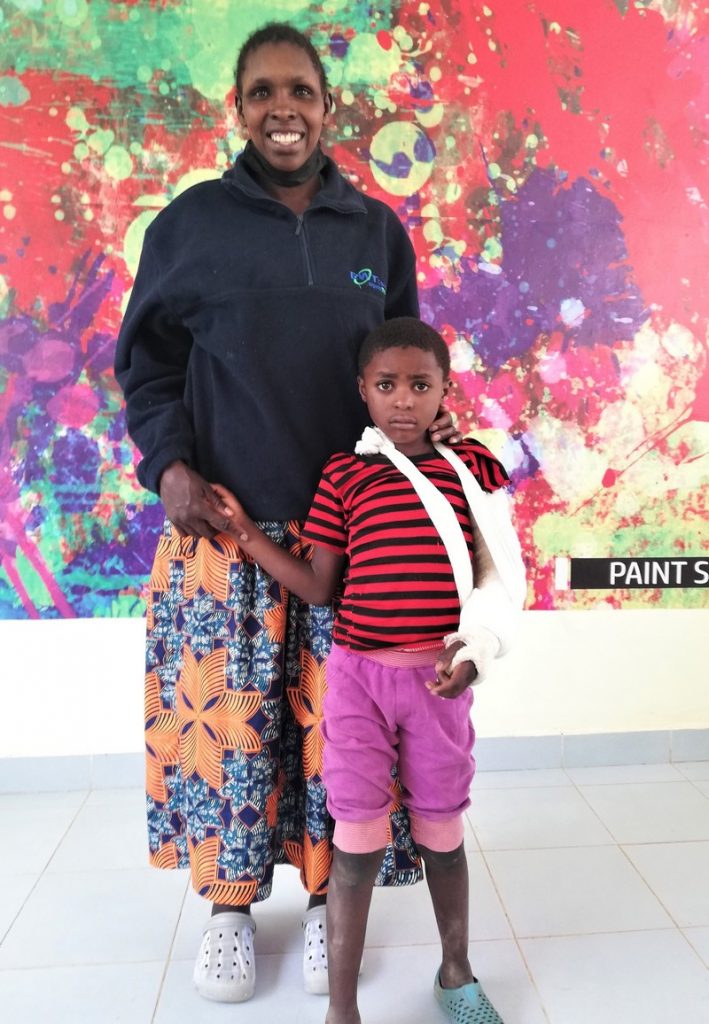
Elizabeth Nyongesa The Girl Guide who has Slowly Found a Hospital-School Balance
“On Friday this week, all the girl guides will be attending their annual competition at St. Brigid’s Primary School.”
Among other pending tasks, given that the event had been pushed a month forward, the secretary of the girl guides team, Elizabeth Nyongesa, needed to avail the play scripts to the school principal and Girl Guides patron. That meant burning some midnight oil for the next two days, as the scripts needed to be handwritten.
At 9:56 pm, Wednesday night, Elizabeth could finally rest. She had the finished copies of the scripts ready, one labeled “The Principal” and the other “The Patron.” Her school uniform was ready and she had organized the scripts in her bag alongside her school exercise books. All she had to do was polish the black secondhand shoes that mom had recently bought her at the local market at half a dollar. Shoes she was so obsessed with since her mom hardly ever afforded her and her siblings ‘new’ items given their tight family budget, especially since dad passed away in 2016 from throat cancer.
Once she was done with the shoes, she set her alarm clock, as usual, to keep her and her siblings, who are all younger than she is, from being late for school. Besides, their school is a little over 3 kilometers away, so they always woke up early enough to walk and arrive in time.
But Elizabeth’s morning was not to come. At least not in the usual way. When she woke up, her legs and eyes were swollen, completely unprovoked. She had not fallen and neither had she put some unwanted substance in her eyes. What had happened? Could it be the result of the long writing session she had had the past two nights? But she was used to writing. She wrote class notes all the time as a 7th grader. So what was this? The next day, Friday, was the day of the competition. Would the swelling pass? Would it stop her from attending the competition? These are questions she hated as they streamed through her little 12-year-old mind.
Unfortunately, no. The swelling did not pass. Not for a long time. It is how she ended up at our hospital, Shoe4Africa Children’s Hospital, about one hundred miles from Busia, her home county. After several tests that led to two misdiagnoses (malaria and typhoid) at the various small health centers she visited in Busia, Elizabeth was finally referred to our facility.
Consequent ultrasound, blood, and other tests that Rufina Oteba, her mom, could not recall, were conducted, after which the doctors determined that Elizabeth had kidney failure. The doctors said that the condition had just recently moved from acute kidney injury to chronic kidney disease. The thought of this hope that slipped through Elizabeth’s fingers, probably by days, or maybe even hours, was heart-wrenching. Could the condition have been remedied had they received the right diagnosis before? One can only leave this gruesomely unsettling question to imagination.
A few days after receiving the results, Elizabeth’s doctors started her on treatment: majorly dialysis, every Tuesday and Friday. “Some of the longest 3 hours of my Tuesdays and Fridays,” Elizabeth said, “but also the hours I can only ever be most grateful for in my life.”
After three months, Elizabeth was discharged, although under the condition that she visits every Tuesday and Friday for dialysis. Mum, fearing the cost of transportation twice every week from Busia to Eldoret, trusted an old friend who lives within the town with her daughter. She then sought a vacancy at a free public school nearby for Elizabeth to study as she receives the weekly doses of her life-sustaining dialysis.
Elizabeth’s doctors say that she should be okay as long as she remains faithful to the treatment. Mum does not intend to let her slip. Thanks to her old friend, things will stay as they are now. Given the passing away of Her aunt, the woman who had offered to donate her kidney to her, Elizabeth, and her mom only continue to pray to God that a kidney donor comes their way. Meanwhile, Elizabeth is slowly securing her territory on her new school’s Girl Guides team. She recently, was, accepted into the team, after she proved herself by winning a debate titled, “Honor is better than riches,” where she defeated last season’s first runner-up. In fact, she had only checked in for her dialysis in the company of her mom, whom she had not seen for over 3 weeks, when I met her and had this chat, after which she went back to her Eldoret ‘home’ to rest and prepare for the next day of school and the new Girl Guides team adventure.
“Life is an adventure, I never planned for this hurdle, but in the hospital, I see many people worse off than me, so, it is for us with health to count our blessings.” Great attitude Elizabeth and we are sure we will find you a donor soon!
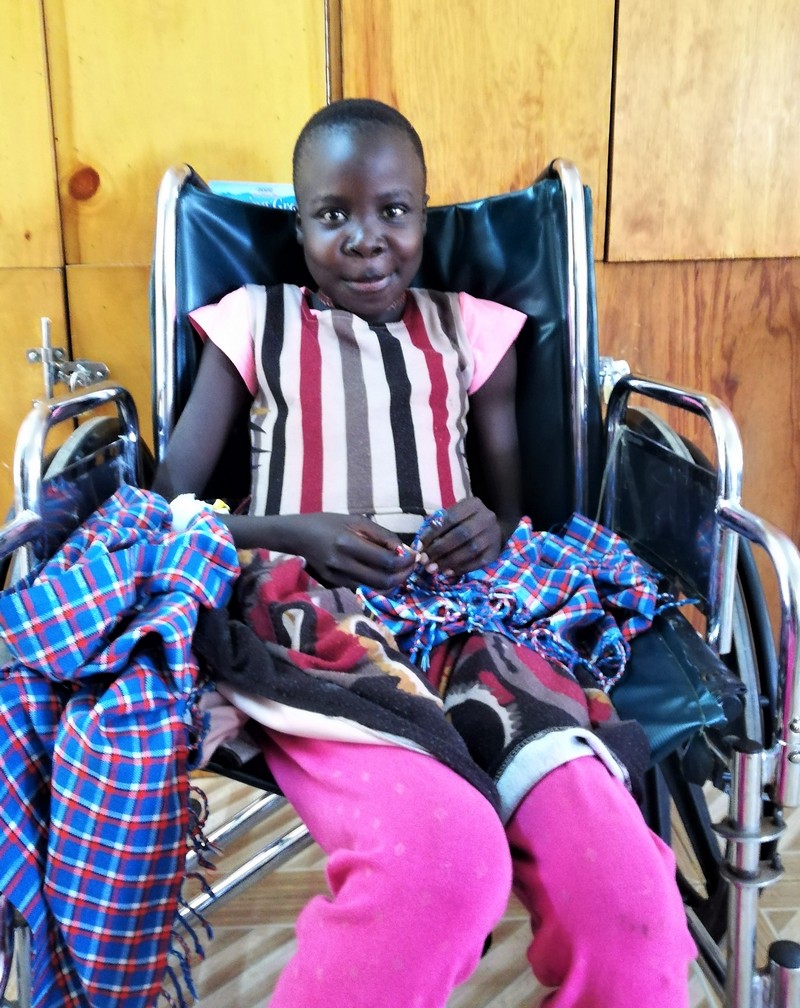
Doreen Chebet’s Mysterious Calf
“How on earth, did I get here? 22 years of being a mother, experiencing the utter bliss of being referred to as patiyem (mom)! Waking up every single morning to the sound of my children singing the family morning chant that has been passed down through the generations of my husband’s family, that starts, Talaitu wee, talaitu wee, talaitu wee cheptalel.
The chant asks God for grace throughout the day and prays that when they come back home in the evening, their baskets will be full. The baskets are more symbolic than literal. The word is used to generally refer to whatever the family embarked on throughout the day.”
Daisy, a middle-aged woman and mother to our patient, Doreen Chebet, said the words above, attempting to understand the series of events that led her to today. Less brisky and unenthusiastic, Daisy inspired a somber mood as we spoke. She is struggling to comprehend how a 10-year-old, jovial, and agile girl could have ended up in the “most fragile of situations.”
A little bit over a year ago, Doreen, an excellent grade 3 student at Kipkelion Primary school in Nakuru County, came home from school with one foot bare. She carried the other shoe in her hand and wore the other on her left foot. It was not anything out of the ordinary, since children at her school ordinarily often come to school barefoot. In fact, Doreen and her siblings do so every often. It is a way of life; plus nobody likes FOMO, especially not children. They even help themselves to the bathroom with bare feet and never lose sleep over it.
On this particular Wednesday evening, however, she got home one foot bare, and something else amiss. She was limping. “What could have happened?” Daisy asked herself. After an extended period of ‘grilling’ Doreen, Daisy decided that she had injured her leg’s calf through a fall. That was the narrative they would go with, because, “how else can one explain such a massively swollen leg, on a child who left home solid as a rock a few hours earlier?” One week. Two weeks. Three weeks of Daisy stuffing Doreen with herbs and home remedies elapsed. Unfortunately, nothing changed. The swelling continued, and although the pain subsided from time to time, Daisy could see that whatever was happening with the leg was taking from her daughter’s liveliness. Her appetite changed and the fiercely smiley little girl grew dull.
Seeing that no success came from the herbs and home remedies, Daisy and Doreen made their way to Londiani Dispensary, a nearby health Center that mostly provides residents with pain medications, first aid, and solutions for small health issues like common cold and running stomachs. Immediately, the attendant at the dispensary directed them to rush to a Kericho hospital, about 50km away. The swelling was moving at a visibly alarming rate. On arrival, an x-ray was done, her calf plastered, and the imaging and medication were given to her. Despite this medical attention, a year of medication, and a tight white band around Doreen’s leg, changed nothing. Another trip to Kericho led them to the doorsteps of Shoe4Africa Children’s Hospital.
They arrived at the end of last week. As it turns out, there was no bone fracture, as the initial hospital had indicated. Our facility moved quickly, took flesh samples from her calf, and tested them. As we spoke, she was awaiting results and possibly attendant treatment. Meanwhile, Doreen has been receiving medication to manage her pain and strengthen her body. Her appetite has also been addressed and her doctor says it will not be long before she can regain her usual weight. For food junkies like myself, this sounds like incredible news, haha!
After our conversation, Daisy seemed more relaxed. “I am so grateful we have a wonderful kids hospital here. This place is like a hotel. I believe it is built by running people. I
recognize that this is a better facility than any I have ever been to and I believe that soon, my distress will be a thing of the past,” she said. Well, I agree. Soon, Doreen will go back home to her siblings where they can continue their chants every day when they wake up, something she says she misses since she cannot chant at the hospital, for fear of being laughed at. She will also get to go back home to Sharon, her older sister, whom she loves dearly because, “whenever mama brings sweets from the shop and I am not around, she always makes sure to keep some for me.” What a sister!
Story submitted by therapist Jeptoo.
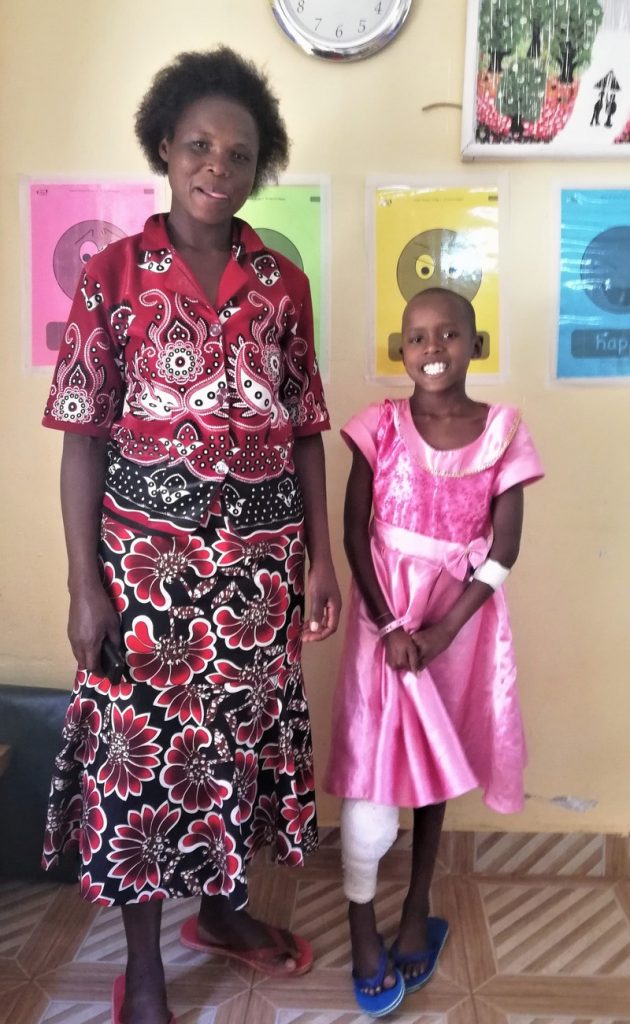
Ivan
At Kapchepsir village, Baringo County, one thing you are usually sure of encountering whenever you visit is a group of men sitting under a roughly thatched structure made from thin wood remains, tied together using tree bark; they call the structure kapurwo (a resting place). Every single morning, men wake up, take breakfast, if any, and walk to this now excessively rickety structure that none of the men who spend their days under it care to repair. They sit and discuss their marriages, their plans to marry new women, or even small conversations like the weather, which frankly, is the mother of all ghettos. The sun often goes crazy and the rains play hard to get.
As these men sit there for the better part of a day’s 12 hours, their wives and old enough daughters are expected to bring their respective husbands/fathers sour porridge, except on Saturdays and Wednesdays when what should be delivered is a guard of busaa, a Kenyan home-brewed beer made from fermented millet, maize, or sorghum flour. The busaa is served in turns; one woman per day, in a continuous cycle. This culture started very many years ago that men from Kapchepsir do not know any other life. Immediately they marry, they assume the right to sit with the other men at kapuruwo. The scarcity of activities to engage in throughout the day is certainly to blame. These men cannot farm nor can they engage in any white color jobs, thanks to their lack of formal education.
Sharon Chelang, a 28-year-old mom of three and a parent to one of our patients never knew life any different from that either. She spent her entire girl-hood serving her father, at kapurwo. She remembers it being fun most of the time, especially on Wednesdays and Saturdays when hers and other dads would get drunk out of their wits and chase them around, without a care for whether their feet could support them. “Although looking back I do not see anything fascinating about it, I enjoyed seeing my father drink himself to stupor and start talking about his children very lovingly. It was the only time we could ever really hear anything positive come out of his mouth. As such, we welcomed the drunkenness,” Chelang said. Even so, she never desired such a life. Having gotten lucky to clear high school, she knew enough to know that she wanted a better and happier family for herself. She wanted a husband who knew and did much more than her dads and granddads. Luckily for her, she married right. She married a primary school teacher meaning that kapurwo would no longer be a problem for her to deal with. Two children later, Chelang finally mastered the ways of a drama-free life. Her firstborn Chepchirchir is happily in 4th grade and her second-born recently started school.
Last month, Chelang had her third child – Ivan Kipchumba, who is also our patient. Ivan was born at a local dispensary in Kapchepsir, where the rest of his siblings were also born. However, his birth, essentially, marked the beginning of a new spate of drama for Chelang. She hopped from one pan onto another one, not nearly as tamed as the first. This time, it was not about the incivility in the traditions her father and the rest of the men put their moms and daughters through in the name of kapurwo. It was about the loss of the stability she had newly mastered during marriage and as a mother.
Chelang and Ivan left the dispensary a day after his birth. “But why has my son not pooped for over 36 hours? Am I not feeding him enough? I’ll go ahead and remove the napkins (a piece of cloth wrapped around children’s private parts, extending to the buttocks to keep their discharge secured) to see whether there is something,” Chelang said to herself.
Baby Ivan was clean. He had not pooped. However, that was not because Chelang had underfed him. It was because he did not have an anus. “What on this gracious earth is this!” She exclaimed. Immediately, they set out to Kabarnet District Hospital where he was immediately referred to our facility, Shoe4Africa Children’s hospital. Here, he spent the first two days in the nursery as he was readied for surgery. On the third day, the operation was conducted. “The nearly 2 hours of his being in the theatre were my life’s longest,” Chelang noted. Through the surgical operation, Ivan now had an anus along with an artificial hole next to the anus, where mucus would be passed. 4 days after the operation, they were discharged, with a clean bill of health.
Unfortunately, last week, Ivan’s colon collapsed causing it to poop out through the mucus hole. Rushed immediately to Shoe4Africa, Ivan, was set to undergo surgery. This nightmare should certainly end! Chelang, who shed tears from time to time as we spoke, feels that this tragedy is too much for her to handle. It has left her distraught, as she wonders what could have happened to justify “such a severe punishment” for her barely three months old son. She, however, is hopeful that everything will go well with the surgery and recovery, and her son can, hopefully, get a new and wholesome lease of life. Challenges at our hospital are not just medical, but we have to help untrained mother’s who have not schooled how to look after their children with no social security system or helplines. The ‘up’ part of the story is Ivan is stable and will be discharged again!

Kosy
One chilly Saturday morning, August 2019, James, who works as a sheep broker, woke up unusually early. His alarm went off at exactly 3 am, just as he had set it, 2hours earlier than his Saturday clock. “What is it? Why are you up early? Is something the matter?” Nelly, his wife, asked. “Oh, sorry! Did I wake you? I’m sorry. I have an early morning today as I have to catch the best of the sheep that will be at Mutwol [the market’s name] today. I heard today’s flock is from Baringo and you know how sweet their meat usually is. People like it better. I don’t want to bother you. I‘ll drink the tea those women friends of yours hawk at the market,” James responded, shut the door behind him, and left.
Being Saturday, meaning no school for the children, the rest of the family woke up at 7 am and had breakfast. At 11 am, Nelly took the kids to the river to bathe for there is no running water in their mud hut.
While there, she would also wash the kids’ school uniforms for Monday. After bathing the kids would lay flat a few yards from the riverbanks to dry. As Kossy (8-year-old girl, Fridel Chepkosgei – our patient aka Kossy) went to lie down, Nelly noticed that she was stiff and was being careful with how she was laying herself down. “Kossy, are you okay? Your stomach looks swollen,” Nelly asked, although with little concern. “Well, mom, I have not been able to pee,” Kossy said.
“What! Since when? How do you feel? Try peeing near those bushes. I need to be sure,” Nelly remembers asking these and many other questions one after the other that Kosy had no chance to respond to any. Her attempt to pee turned out just as she had told her mom.
I think motherhood laces a person with just enough paranoia to raise a tiny human being. They call it maternal instinct, or something.
Quickly, Nelly carried Kossy and left for home where her phone was. The clothes she left at the river would be brought back home by Kossy’s siblings.
Shortly later, James got home but unfortunately, neither he nor Nelly could explain what had caused this. “No one in the family has suffered this kind of thing,” James noted. “Not on my side of the family either,” Nelly added. They were surprised that a perfectly healthy girl who had slept soundly the previous night managed to go without peeing that long, and not say anything. But maybe it was because she was shy. Or maybe she could not talk about it because it is still taboo to mention anything related to sexual organs in their community. At this point, anyway, her stomach was swelling even faster so something had to be done… fast.
They hopped onto the first rickety mini-bus for public transportation they could get along the closest highway and headed for Shoe4Africa. A few urinary catheters (a flexible tube used to empty the bladder and collect urine in a drainage bag) and a couple of medications in, Kosy was back to being as healthy as a horse. A year later, Kosy and her mom, Nelly were back at Shoe4Africa. The condition had recurred. She received similar treatment as before and just like that time, she bounced back like it never happened.
Sadly, today they are at our hospital, where they have spent about 2 months. This time, however, the doctors were not about to take anything to chance. Two catheters were screwed onto her lower back and a third in her urinal duct. Gladly, these two months of medical rehabilitation panned out quite well. In fact, as we spoke, Kossy has just received the discharge notice and was waiting for her dad so they could leave.
Happy and healthy, she spent most of that waiting time saying goodbye to her friends at the hospital. In fact, she doesn’t want to leave as she prefers the facilities at our school classrooms that we have built in our hospital grounds.
From the way she and the others related, it was clear that the past two months had been fun despite the occasionally harsh treatments. The other kids even requested stickers from the facility and stuck them all over Kossy’s face as a going away gift!
Once the celebration was over, Kosy picked up her mom’s phone to call her sisters. As she spoke blissfully to her sisters, Nelly recounted to me how she had found grace in hands of the doctors who treated her daughter. She thanked the hospital’s management and personnel and made a prayer for them before we parted ways. Nelly says to persuade Kossy to leave our hospital, dad had to promise to slaughter a sheep…only then did she agree to leave! Had we known, we would have donated a sheep from our Shoe4Africa farm! Nelly asks for us to say a big thank you to the Shoe4Africa supporters. the ones who run for us. So, from Nelly to you – THANKS!!
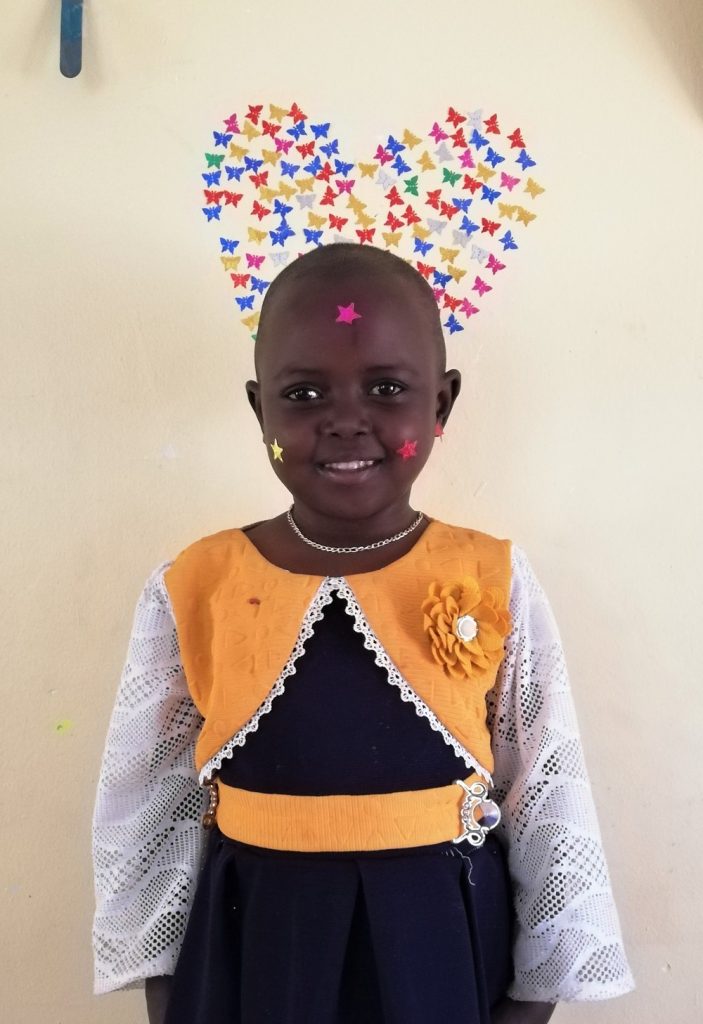
Hudson – Child Life Specialist,
“One morning in June 2005, I walked into the school staffroom at Langas Primary School where I was a teacher. As usual, my fellow teachers and I would say hello then enter brief chats, sometimes about the lessons we had ahead of us, sometimes about politics, and other times about the previous day or hopes for the new day. Most Monday mornings, though, were spent discussing a soccer game that stole the weekend or a notable event that took place. This particular morning’s discussion, however, was different. The government had recently disbursed resources to set up a section for children living with disability at our school. With the completion of the setup, a significant part of the morning was to be spent on enrolling the students. By 8 am, the earliest parents had already arrived, anticipating a new and hopefully better season in their kids’ lives. After an eternity of no recognition by the education system, a light had finally shown on them.
As I walked into the staffroom, the buzz was louder than usual. Everyone seemed to be deeply engaged in one common conversation – Who would bear the responsibility of whatever had to be done with these students? I could sense that most of my colleagues were opposed to the idea of having an abled children institution hosting children living with disabilities. They were unwelcoming to the idea that they were now responsible for these children until the government sends teachers trained to handle them. Were they scared of these children or did they simply not have the calling to be teachers? While it is difficult to tell, I believe that teaching and, generally, dealing with children is about providing support to enable them. Shying away, as such, reflects differently on this fundamental responsibility. Long story short, it is on this morning of June 2005 that I experienced a shift in my calling to serve children better. I wanted more! I wanted to be right at the center of the crossfire! I wanted to teach the children others would not. My being here at Shoe4Africa today is thanks to this shift.”
After spending over a decade of his life as a primary school teacher, thoroughly enjoying it, Hudson, changed professions out of a sudden realization that his love and passion for children could be better spent with those who need it dearly. Given the stigma and isolation that often comes alongside disability and chronic illnesses, Hudson wanted to be the source of a difference. The thought that other children were seen and received differently because of an ability difference tore his insides. He burned to do better and abandoned his entire teaching career and the family legacy built on the teaching profession, to start afresh in the health sector. To do this, he had to attain certification to work with kids through rejoining school; first pursuing a certificate course in Child Care Giving. Hudson, later on, pursued a higher diploma and bachelor’s degree in Psychology, respectively (he just recently, at 50 years old, graduated with the degree).
Starting his work with children in 2010, Hudson has never looked back. According to him, there has never been anything more fulfilling than this profession. Over the years, he has interacted with children from a world of walks – rich, poor, disabled, abled, chronically ailing, younger, older, illiterate, literate, linguistically competent and incompetent, and anything you can possibly imagine. Have there been days that he went home wondering why he picked this line of work? Absolutely! According to him, it is on the hard days that he recommits ten times more, to the intention to serve children, pondering the question, “If not me, then who?”
Thankfully, though, in every “1 of averagely 50 days,” Hudson enjoys his job. Bringing reassurance to the kids at our facility in the form of play, chats, and study brings him the most fulfillment he could ever imagine. As a father of 4 children, he understands the need for love and acceptance. With this understanding, he makes sure never to do less than show compassion to our patients. Despite rising up the ranks to the supervisory role, thanks to his excellence at service, Hudson delivers on his primary responsibilities as a CLS, while also guiding his subordinates and ensuring a united front when it comes to loving and serving the kids. Together with his CLS team, he ensures to set up schedules for both the mobile and immobile kids. He, among other empowering activities, also sets aside time to teach Swahili (Kenya’s national language) to those kids who have not had the privilege of attending school.
Hudson was recently recognized by the hospital as the most driven and result-oriented CLS supervisor the hospital has ever had. His record shows unprecedented improvements in both the physical and mental health of the patients. He also often runs into children and parents outside the hospital who always make sure to stop, greet, and thank him for the work he did for them while they were at the hospital. Hudson says, “There is nothing more motivating than such instances that I ‘meet’ and experience my successes!” As a hospital, we could never be grateful enough to have a person with such zeal and spirit as Hudson’s! We are even more blessed that he intends to serve with us, as he says, “for as long as my life can allow.”
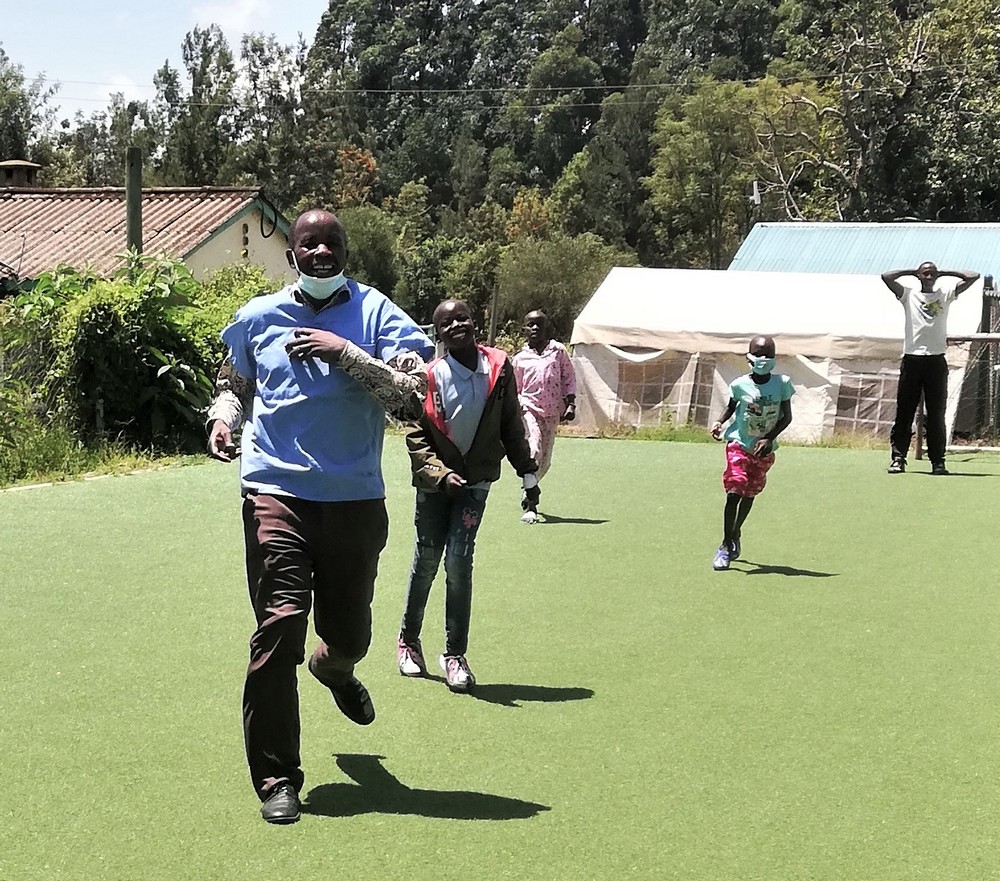
Hudson Kimakasi, Child Life Specialist (CLS), Shoe4Africa Children’s Hospital.
Paul’s Makanga’s story
Close to 11 years ago, Rose Nelima, was wheeled into an operating room one month after childbirth. Had her uterus developed complications? Did she originally have a uterus abnormality that needed better attention at childbirth? There’s no telling. What’s for sure is that the complication only surfaced after the birth of a bouncing baby boy, but also that the boy brought this first-time mom so much joy. Neighbors often spoke about always hearing the distant sound of her songs to the baby. Her favorite was the lullaby song,
Lala toto lala
Lala toto lala (Sleep baby, sleep)
Mama anakuja lala (Mama is coming, sleep)
Akupe maziwa lala (To give you milk, sleep)
Pamoja na uji lala. (With porridge, sleep.)
A few weeks after the surgical operation, unfortunately, Rose’s heart gave out. Someone had to take care of the 2-months-old boy she left behind. Since it is taboo for men to care for children in Rose’s community, Rose’s husband could not retain custody of the boy. As such, brothers, sisters, the husband, and close relatives gathered soon after the burial to discuss the boy’s new home. Luckily, he got the best new mom that anyone could ever have.
Obunaka, with two kids of her own and a sister-in-law, has raised Paul like he were her own. As we spoke, one could not help but notice how she refers to him as “My lastborn.” She looks at him with a yearning for health and wellness. Occasionally balancing tears, I would catch her staring at the boy as if sharing in his pain.
She speaks of Paul as her most intelligent and hardworking, albeit very silent, kid. When asked how it has been living with another woman’s child, in her financial state, and being a single mother, she says that she has never looked at Paul differently and so providing for and loving him has never been a challenge, even in her toughest financial times. Paul’s ease and satisfaction in being around Obunaka were enough to tell you as much.
Sadly, Paul, who lived his entire life healthy, and strong, recently had to be rushed to our facility from a hospital that is about 70km away. What was wrong? Well, one Wednesday morning, Paul and his family woke up and went through their usual morning ritual – wash their faces, fetch water for cleaning dishes, drink tea (breakfast), clean the house, and then disperse to handle duties as they arose. Just when they were about to set out to a neighbor’s farm to guide farm-plowing oxen, Paul complained of pain in his stomach, which moved from minor to the extreme in minutes. Halted plans, huh? There was no time to ask questions or second-guess the decision to take him to the hospital as it was clear that he needed attendance.
After failed attempts of two hospitals to identify what went wrong with Paul’s stomach “out of the blue,” someone told them of Shoe4Africa; the miracle and best hospital in Kenya.
Immediately upon arrival after a long day’s travel, Dr. Kiprono, who was at the emergency unit fetching x-ray results for a patient he was admitting, took it upon himself to receive Paul who was effectively in chronic stomach pain. If you think swiftness is important, wait until you see it in medical emergency situations. Dr. Kiprono and other emergency personnel wheeled him in and took tests to ascertain his condition.
“He needs colostomy [diverting the large intestines through an opening on the tummy to pass waste],” Dr. Kiprono muffled to his aides although loud enough for Obunaka, standing one meter away, to hear. She did not understand what that was but given the doctor’s facial expression, she knew this was not going to be easy. Paul was wheeled to the operating room soon after, where a stoma (small opening) was made on his colon to move waste out of the body. After that, he was sent to ICU for three days before being admitted to the Upendo ward. At Upendo, he and Jose (Joseph), a fellow colostomy patient have become best friends. Jose, who is about a year older, came on the same day as Paul and has learned to play The King of Fighters, an android-supported game, thanks to Paul’s help. Their current plan is to get another game that must be more challenging and exciting than this one, saying, “We love a good challenge!”
Along with such great social progress, Paul’s health progress, just like Jose’s, is improving every day. Obunaka says that she is happy that her son can now walk and play outside with the rest of the kids and that he is slowly regaining his weight. She says that her son’s nurse assured her that the boy has shown tremendous recoveries, which is why Paul has been scheduled for an upcoming surgery to reposition his colon, after which he can recover and go back home. Well, for a woman who has seen her son suffer the loss of his biological mother and then such health ordeals, Obunaka is very excited that all the pain and sacrifice are paying off. She prays that things work out sooner so that they can resume their life and “my son can continue to pursue his dream of being a pilot.”
Indeed, Paul will soon be well so they can be on their way! Fun fact, the name Makanga (Paul’s Swahili name) means a conductor (an assistant to a driver in public transport). It is no wonder our Paul exhibits excellent device and machine control such as in The King of Fighters.
Very soon, Paul is going home, and he says a Big Thank you!
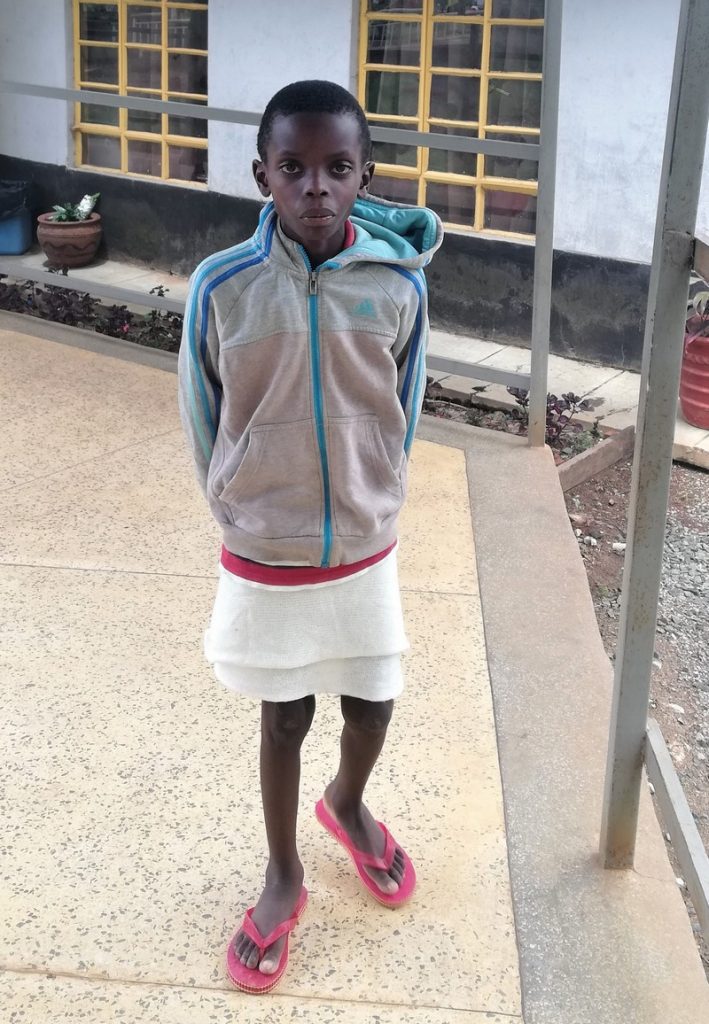
Godwin’s story
Today, at around 3pm, Godwin Kipkemoi, 3, walked back out of Shoe4Africa Children’s Hospital, in the company of his mother, grandmother, sister, and father, after roughly 2 months of vigorous, back-to-back, cancer treatment for his nephroblastoma.
As is the tradition, our cancer patients always try to organize a send-off party to celebrate those who beat the disease, those whose cancers go into remission, and those who get discharged for incredible improvements. Soon after the party, we make a follow-up interview with Godwin’s mom, Faith. Almost one and a half months after our first conversation, Faith appeared less apprehensive and more optimistic. In fact, she was so easy that she ensured to take pictures with doctors as she and Godwin left their hospital ward.
What has been the most unsettling part about this entire period, we ask.
“Is my son going to die? This is a question that lingered in my mind a lot but one I never dared ask the doctors,” Faith responded.
Luckily, for her, the 6 rounds of chemo that Godwin underwent have, so far, proven effective. The additional treatments have made Godwin’s recovery even more successful. The surgical operation he underwent last week to remove the infected kidney has also moved Godwin from the critical cancer phases to a path to full recovery. The surgery plan called for a zipper-size incision in Godwin’s abdomen. According to his doctor, Dr. Onsonko, with strict adherence to medication and the medical check-ups scheduled for him, Godwin should resume perfect health.
Outside our facility, awaited an auto rickshaw, a motorized version of the pulled rickshaw so common in India. It is called a tuk-tuk in Kenya due the underpowered engine noise. Andrew, Godwin’s dad, who had hired the automobile, stood on its side waiting to load up the few bags Godwin’s mom had with her. Godwin’s usual life was about to resume.
A few yards from the tuk-tuk, grandma, Grace (Godwin’s cousin), and Alaine, Godwin’s sister, stood. As soon as they set eyes on Godwin, Alaine ran fast and gave him a heavy embrace that left Faith screaming, “Nooo! Not so hard, Alaine!” Godwin went under the blade exactly a week ago so massive impacts such as that of Alaine’s hug threatened the safety of Godwin’s stitches. None of his parents knew what it would look like if the stitches tore, but it would be a scary and tough setback. Besides, Godwin’s other doctor, Dr. Lang’at, had said to watch him closely.
However, most family members had feared Godwin would not survive, so the overflowing joy was understandable. Almost everyone in Kenya knows a family member who has not survived Cancer. As earlier stated, the chances of surviving cancer in sub-Saharan Africa for a child are 10%, as opposed to 90% in the USA.
The next embrace was grandma’s, which lasted about a minute, since grandma landed long smooches on boy’s face in excitement. To a westerner one might wonder why the grandma was ‘dribbling’ on the boy’s face, but Dad explained,
“Saliva is used to bless people in our community” – the Kipsigis, who live in Kericho, a town famous for producing tea three hours drive from Shoe4Africa. To them, whenever an elderly person spits on you to bless you, your chances of succeeding at what you are doing go up. This had been the case for Godwin’s cousin, Thomas (also dribbled upon), who is now living his dream to study law at a US university. Many believe that his academic opportunity in the US has to do with the saliva his grandma spit on his hands the day that he joined his first year of high school.
All our staff gathered for the send-off of Godwin. When a patient ‘lives’ at our hospital, they become almost family. Dad embraced his son as he struggled to balance tears of joy. As we waved goodbye, a mass of relief accompanied by a struggle to contain our emotions took over. All the employees around started to disappear into doors and corners they could find to avoid being noticed as they dried their eyes.
This is the story of another patient that was helped from your support – thank you! We hope for more of such days; when families unite and leave happily.
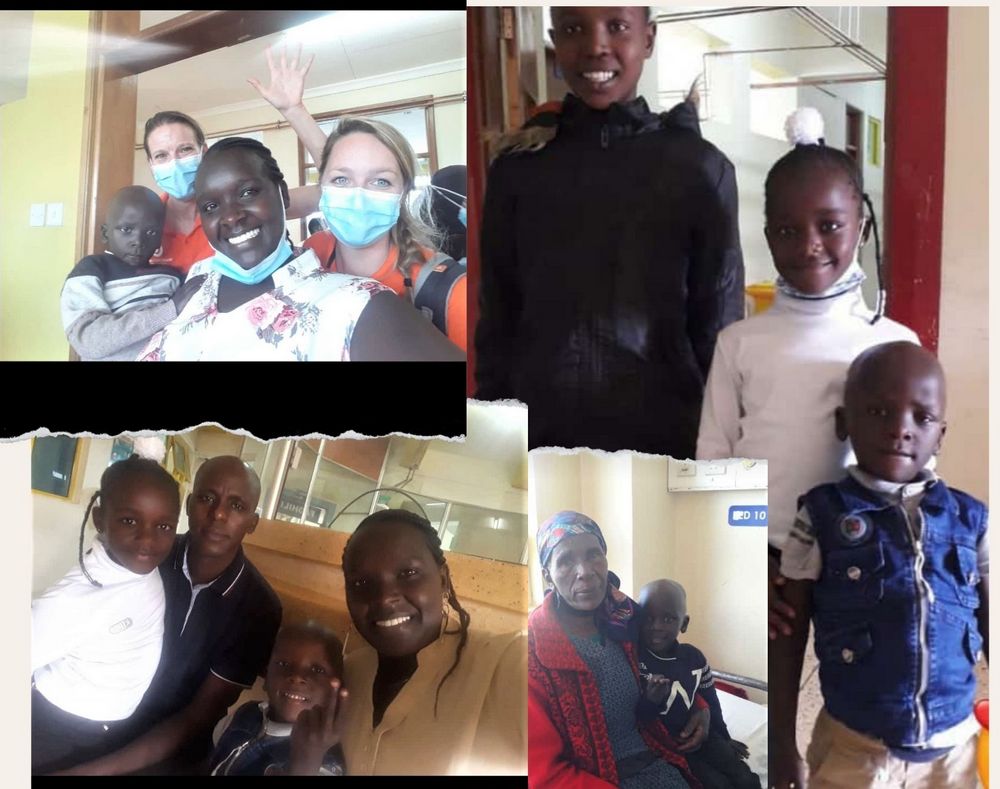
Purity’s story
It is not every day you come across an incredibly self-aware 10-year-old. One with just the right wits for every conversation you bring up. One who understands not only her duties to herself, family, community, and friends, but also to her country. Purity Akoth, a patient in our Renal Unit, is one such 10-year-old. Purity, the extroverted girl with a zeal for service, especially in the government and health dockets, speaks very highly of her country, Kenya.
She believes that although it has not yet reached its full potential, there is hope. She is very appreciative of how, cumulatively, the current president, Uhuru Kenyatta, has managed to steer the country towards infrastructural growth, citing the now tarmacked roads in her village.
As the elections approach in Kenya this August, Purity says, “I hope we get a great president who will help us out of this bad poverty.” Seeming disturbed, she says, “I hope to be home and well by the time the campaigns climax so I can help rally people to vote for the best candidate.” She even has her eyes on a presidential candidate whom she says she would vote for if not for her young age.
It has been 5 months since she was brought to Shoe4Africa for treatment following a hectic number of weeks in and out of her home’s local clinic.
Now receiving treatment to sustain her as she awaits a kidney transplant, following its failure, Purity’s previous doctors did not know that she had renal troubles. It started in July of last year while in school. It was during the last week of the term, so exams were ongoing. “I felt weak, nauseated too often, chest pains, and occasional confusion,” Purity said. “Although I managed to clear the exams, I was constantly in discomfort,” she added.
School closed on Friday and her mom, Triza Akinyi, immediately took her to the hospital. One clinic after another, each facility issued referrals, until Akinyi and Purity ended up at our door. As is our facility’s tradition, preliminary tests followed, after which results were shared with Purity and her mom, renal failure. Dialysis started soon after and has never stopped since.
Purity says that during the time she has spent at Shoe4Africa, she has seen that some professions are truly noble and, essentially, of God. She says that she sees doctors and nurses at our hospital working so hard; despite the huge number of patients they get, they religiously attend to each and every one. “This spirit has forged in me a new desire because while I have always wanted to be an accountant, being a doctor would serve a greater purpose. I have seen firsthand how much doctors do to save lives, and I can confidently say that I want to join this noble profession so I, too, can join the life-saving bandwagon. It is only fair,” Purity stated.
We could not agree more with this little ten year old. The doctors and hospital staff at our facility work day and night to ensure that each child that walks or is wheeled into our doors receives that potentially lifesaving injection, medication, counsel, or support.
Like every other patient we handle, we have extended the best care we can to Purity. Her mom says, “I truly appreciate Shoe4Africa for offering us its help wholeheartedly, and always making follow-up phone calls when we are away to ensure that my daughter is fine.” Although mom and her husband struggle to save the bus fare to travel to Shoe4Africa while also paying all other bills for two other children, they are glad they get to see results in their daughter’s healing journey. The decision to leave her small job as a chef at her children’s school to care for Purity in hospital has paid off, despite the financial bumps that they have endured, consequently. Even Purity’s father who was initially very hesitant about Purity traveling 3 hours away from home to seek medication, has been more graceful with his comments ever since she started to see her daughter’s recovery. In fact, during a visit he paid his daughter, Purity’s dad said that he has never seen any facility that has half as much kindness and effectiveness as the Shoe4Africa hospital.
For Purity, and all children, we at Shoe4Africa always try to heal with love and caring for all patients… and, we will keep a job open for Purity when she grows up and becomes that doctor, because if she is this determined at her young age, we are sure she will make it!
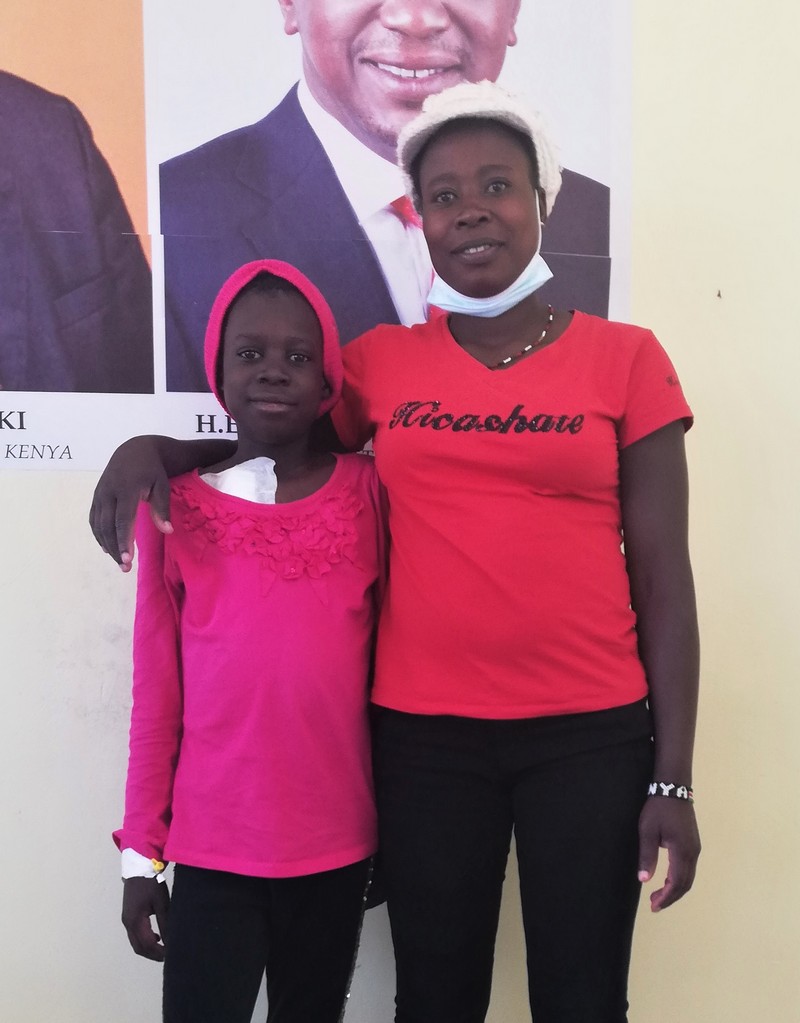
Kachewu’s Story
About 2 years ago, the government finally started to build a school in Tiati Village in Baringo County, Kenya. The area had been without a hint of education forever and so this was an addition without a match for the community. Throughout the construction period, parents from Tiati and surrounding villages lined up at the area chief’s place to book slots for their children because they did not want them to miss the opportunity of free lunch food, and water along with the education. Finally, their children would have a place to spend the day and a guarantee of not going hungry, as they would get a daily meal every five days of a week. Kachewu Rotich, a 6-year-old boy who is also a patient at our facility is one of the kids whose parents had ensured to reserve a slot for. His aunt, Doreen, who cares for him at our hospital says that when the news about the school came, Kachewu’s dad, Rotich, immediately made his way to the chief’s place. For Rotich, it was more about the chance to get an education, although the opportunity for all of his 6 kids to get fed every single day was a very much welcome addition. Having not received an education himself, thanks to the lack of schools within their area, Rotich was very excited, and even dubbed the opportunity a “God-sent gift.”
They say timing is crucial! Well, it was for then 4-year-old, Kachewu, considering that he was going to attend school at an incredibly young age when compared to the rest of the kids he would be studying with. He, unlike most others who did not sign up for school, would eat daily for 5 days instead of skipping meals as was his norm.
“This was such a grace,” said Doreen. She added that most of the kids who were allocated elementary school slots were around 15-18 years, and the chief was saying older boys should get a prioirty to school over the youngers ones, making Kachewu and a few others very lucky. But the timing was only so good for Kachewu, as somewhere mid-2020, his health took a sudden plummeted! For a little boy, whatever he ailed from was too alarming. His pains were a mystery. Even the village herbalists who promise, for the price of a few cents, to cure anything could not contain his pain, despite shoving tons of herbal medicine into the boy’s tiny throat. What was certain, though, was that Kachewu’s problem was based in the stomach.
Dad and his son’s trips to the closest dispensary (many kilometers away and very scarcely equipped) started. Soon, the dispensary attendant who could not be anything more than a high school graduate, according to Doreen, recommended that Kachewu be taken to a better-equipped facility in Nakuru town. It took Dad nearly a week to raise the 8 dollars that they would spend on bus fare; Kachewu had to sit on daddy’s lap since that 8 dollars only covered one person’s fare.
The Nakuru hospital tested the boy and found that he had a liver disease. Treatment commenced and Kachewu started to recover. However, as he left the hospital, the doctors recommended that he got better cared for. He would need food every day, clean water, and a clean place to sleep. None of these things would be available; much so considering that all the money that Rotich and his entire family had saved, had already been spent at the hospital. So once again, the school and its feeding was a God-sent opportunity. Thankfully, the construction was in its last phases and the area chief was already rounding up teachers from neighboring villages (anyone with a high school education became a teacher; very few).
Although he would not get a hygienic place to sleep since his family slept on the floor using dried animal hides as mattresses and a ‘Maasai shuka’ and excessively torn clothes (as blankets), Kachewu considered himself lucky that he didn’t sleep hungry.
Sadly, a few weeks after leaving the hospital and joining school, Kachewu fell sick and was rushed back to Nakuru. The facility declared incapacity to handle the little boy’s case. They referred him to Shoe4Africa, where he and Rotich arrived in March 2021. Our diagnosis indicated that this time, it was not his liver that was sick, it was both his kidneys.
“Myat!” Doreen exclaimed! This translates as, “What horror!” Her feeling was justified. To recover from one deadly condition to an even worse one “could only have been a product of failing luck,” according to her.
Since diagnosis and admission at our facility, Kachewu, has slowly but consistently recovered his portions of luck. He was started on dialysis and received calcium medication four times a day, which is meant to help with his weak bones that have left him nearly bow-legged and stunted in growth for a 6-year-old. Slowly, the dosage has reduced, and he currently only receives the calcium medication in the morning. Most importantly he receives dialysis on Tuesdays and Fridays. Incredibly, he is starting to feel full of health.
The doctors are happy with his progress and so is the family. Rotich is even talking about requesting discharge, but that is only if Doreen and Kachewu can get a place to stay within Eldoret to avoid transport costs to and from Baringo. When asked how Rotich plans on getting a temporary settlement in Eldoret, Doreen says that she is thinking of starting a small grocery business around town. It should commence as soon as she gets “some money to rent a small house, buy a mattress, blanket, and jiko [a stove made from iron and mud], and extra change to set the business up,” she said.
Perhaps someday Kachewu will be able to go back to Tiati and resume his education. With any luck, Aunty Doreen’s proposed grocery business could help him attend school in Eldoret as he continues treatment. For now, our hospital teachers should do just fine and our massive library of 15,000 books. Since arriving at our facility he can now read and write, and he gets three meals a day. Mom says our hospital is a better option than being at home, when he relies on a single school meal. Again, this story illustrates how needy our clients are.
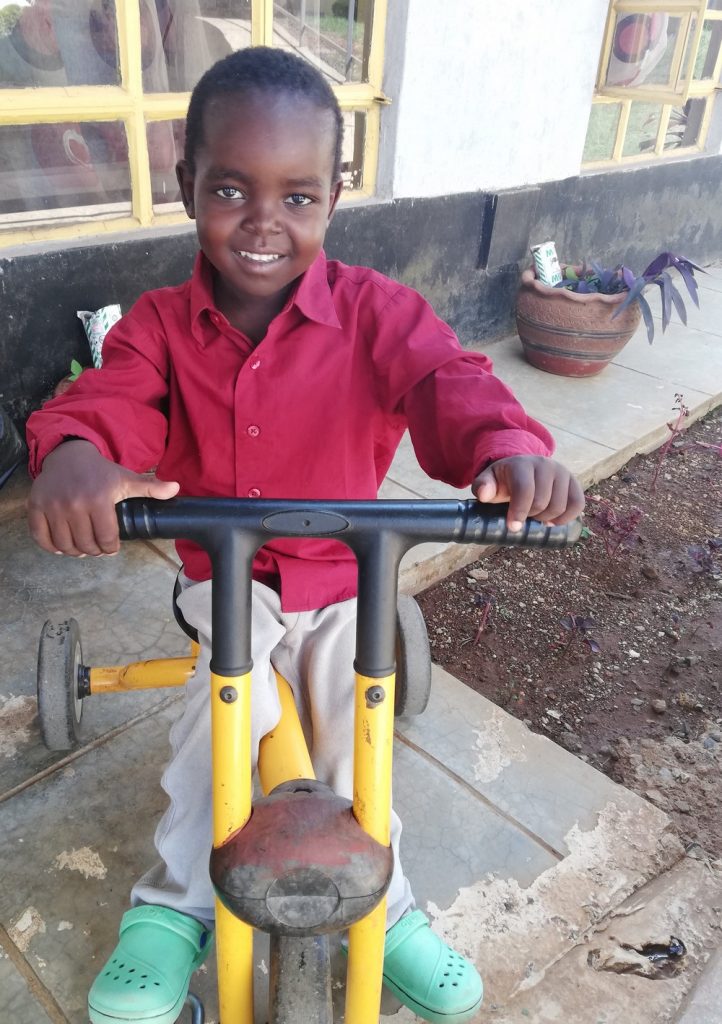
Simon’s Story
It is quite amazing what determination can do. It is, in the least, a prop for positive change. Simon Losiwa, 12 years old, is a testimony to the value of this virtue. Simon, a patient at our facility, comes from Pokot, a semi-arid area in Kenya, where temperatures on a ‘beautiful sunny day’ can rise to 40 degrees Celsius or more. His family’s land, and tons of hectares around it is essentially a desert. It grows nothing except cactus and thorny bushes. It’s occupants can only keep desert-hardy cattle. These hardships have doomed this area into a wild hub for poverty.
Simon says that apart from food being scarce that he and siblings are only ever able to get dinner (not guaranteed), he is also forced to walk miles to school every morning and evening. The school he attends is barely developed. There are scanty rooms made from mud, which serve as classrooms, perforated roofs and walls, and a dump for a latrine. There is one hardly decent concrete-made room. It is used as the staff room and school store for valuables like the scarce textbooks. The class writing boards are also kept in this room every evening to secure them from thieves or any vandalism.
His school also has very few teachers, as are the students, because “most children and parents do not value education. It is still frowned upon, especially when the distance from children’s homes to the few schools is considered.” Despite all these, Simon has managed to attend school. In fact, he is now a grade 5 student, who excels wonderfully in class, and whose favorite subject is Math. Simon says that Teacher Choria, his overall teacher, has been so gracious in his devotion to help him and the other learners gain academic knowledge. “You see, I have been more focused on what I could get from putting in effort in my education, than the challenges that I endure at home or school. I want to change my family’s and community’s life,” Simon made sure to note.
Actually, Simon should have been a 7th grader if he had not spent the better part of the last 3 years checking in and out of hospital. Instead, his story started to take a rough turn towards the end of 2018 when he developed a swollen patch on the side of his neck. He was treated for tuberculosis at a local healthcare facility. It was only in 2019, when the swelling would not go away, and he began to grow pale, that he was referred to a better hospital around home. Tests took nearly a month and when the results came, he was referred and ambulance-lifted to Shoe4Africa. Between the blood and tissue samples being collected and the results being delivered, Simon had grown worse. His stomach, leg, and the other side of the neck also began to swell. Excruciating pain also kicked in.
By the time they got to our facility in March 2019, Simon was barely able to walk. He had grown weak and unable to eat. He also experienced fatigue, chills, and fever, all of which are symptoms of Hodgkins Lymphoma (HL). The results had confirmed as much – HL, a form of cancer of the lymphatic system, where lymph nodes in the neck, armpits or groin may swell. Upon arrival and preliminary testing at Shoe4AFricaour nurses helped settle Simon and his dad in Subira Ward where he started treatment. “The next 6 months were painfully long, but we survived, notwithstanding the back to back chemotherapies,” Simon said. During this time, he got very fond of fellow patients, parents, and working personnel. When asked about his experiences then, one teacher, Teacher Doro (Dorothy), came to mind. Simon says that although he just found out that she moved to the US about a year ago, Teacher Doro was the closest thing to a mom, teacher, friend, and sister as she could ever get while at the facility. He is glad he got the chance experience her.
It is sad, however, that after leaving at the end of August 2019, the next time they were able to come back for checkup was in 2020, after months of scraping up the 12 dollars for fare. Throughout the entire 2020, they were only able to visit three times. Luckily, he was okay for the most part of 2021, until 30 December when they had to rush to back, “because I started to vomit, swell, and weaken, just like before.” The doctors have been working tirelessly to restore his health, and according to Simon, their help has worked like a charm. He has already bounced back, ready to go back to school to strive so hard to become a doctor, just so he can help others like him. In fact, Simon says that “the fact that I am behind in school stands no chance against my dreams. Although I, initially, wanted to join the military, I now want to save people’s lives, and I will do it, no matter what!”
Honestly, a strong-willed man is all it takes to birth an empire of a success, and Simon, certainly has it all – the desire, determination, and strong will. Currently, he is not sure about how well his treatment will go, but based on his doctors’ promise, he should make a full recovery and be back in his village with the rest of his 7 siblings before he knows it. As should as his determination, he will. “Frankly, nothing would be more pleasing than to see him go out and conquer the world, and I believe he will,” said Nicholas Losiwa, Simon’s dad, who could barely create a sentence in Kiswahili, Kenya’s national language. We, Shoe4Africa, agree with Mr. Losiwa and are already excited to see the greatness ahead of Simon. Perhaps someday, he might bring his medical expertise to our doors to help other children.
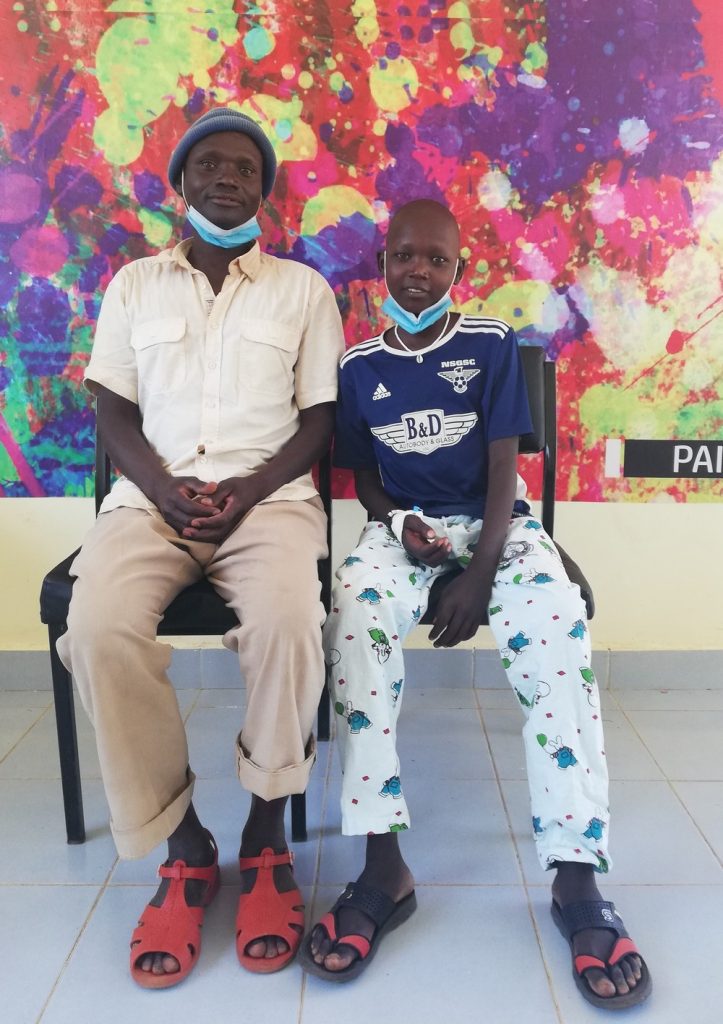
Kim’s Battle
“Every day, I wake up, get on my knees, and ask God for better. Better than what I am having to endure! My pastor thinks I should continue, but sometimes I just can’t!” started Jackeline (commonly known to us as Mama Kim), Kimutai (Kim’s) mom.
It’s a little bit over a month since Kim started feeling pains in his stomach, which led to his first and second hospital visits, and now, his hospitalization at our facility.
Kim, aged four, who loves water, lit up when he heard his cousins had handcrafted a small boat out of driftwood collected by the riverside. Thus, he was jumping up and down one weekend as he boarded a rickety public bus, called a matatu, with his parents, Jackeline, 29, and Charles, 28, who labors as a maize farmer six days out of seven, to go and visit Grandma Jane in Kapchesaina where his larger family, and his cousins, have resided since anyone can remember. Kapchesaina, a small farming village of around twenty families, lies ten miles from the town of Nakuru, known as the former capital of the Great Rift Valley. This was to be a wonderful holiday of family bonding and water games, yet it quickly turned out to be a nightmare experience that no one has forgotten in the family to this day.
Splashing around in the waters all day was maybe why Kim was not hungry as the family sat gathered for a wholesome meal that night. Nobody questioned as Kim complained of stomach ache and retired early to his room. The family had a lot to talk about, the price of maize, an uncle who had broken a leg, and local politics which had started to dominate the news, yet Kim groaned through the night, unable to sleep. What was wrong?
The next morning, before the sun had risen, Jackeline knew she must fetch a doctor, or a nurse. Anyone who could explain why a cheerful boy, who hadn’t eaten, was groaning in pain. Had he swallowed too much water? His cousins said not. Could it be malaria? Uncle John suffered from Malaria and he never groaned in pain. Uncle John would sweat and complain of headaches.
At the dispensary, no one could diagnose the boy and he was given vitamin C tablets and told to rest. Rest did nothing. Two visits to two different hospitals set her on her way to Shoe4Africa after a frightening diagnosis; cancer.
Today, Kim sits at our facility, almost four weeks since arrival. Preliminary tests indicated that he has cancer of the kidneys. Thanks to treatment, the little boy “has shown massive improvements.” Despite losing 6kgs, so far – from 15kgs to 9kgs, Kim’s progress has been better than can be said for most children his age who are receiving chemotherapy. Today he is on his third course of chemo. His doctors say that he should receive six courses in total before reassessment. That means that he is currently halfway done.
Asking the mom about what she likes about our hospital she says the therapists who aid our doctors.
“Eliza has endeared herself to Kim’s heart.” Mama Kim says “Eliza has certainly made it easier for me. I do not struggle with my baby during treatment because she is gentle with my son and takes care of most treatment activities. Kim sometimes even barely realizes that he just has an injection because of the therapist’s work. What blessed hands Eliza has, indeed!”
At our facility, Eliza’s spirit is what we look to cultivate. We believe in being kind and compassionate while accomplishing our duties, so we could not be gladder to hear such comments as Mama Kim’s. As we continue to support Kim, we hope he gets well soon and resumes his life back in Kapchesaina, the village he comes from. Why does he yearn to go back we ask the boy? Is it school? No, it is the boat!
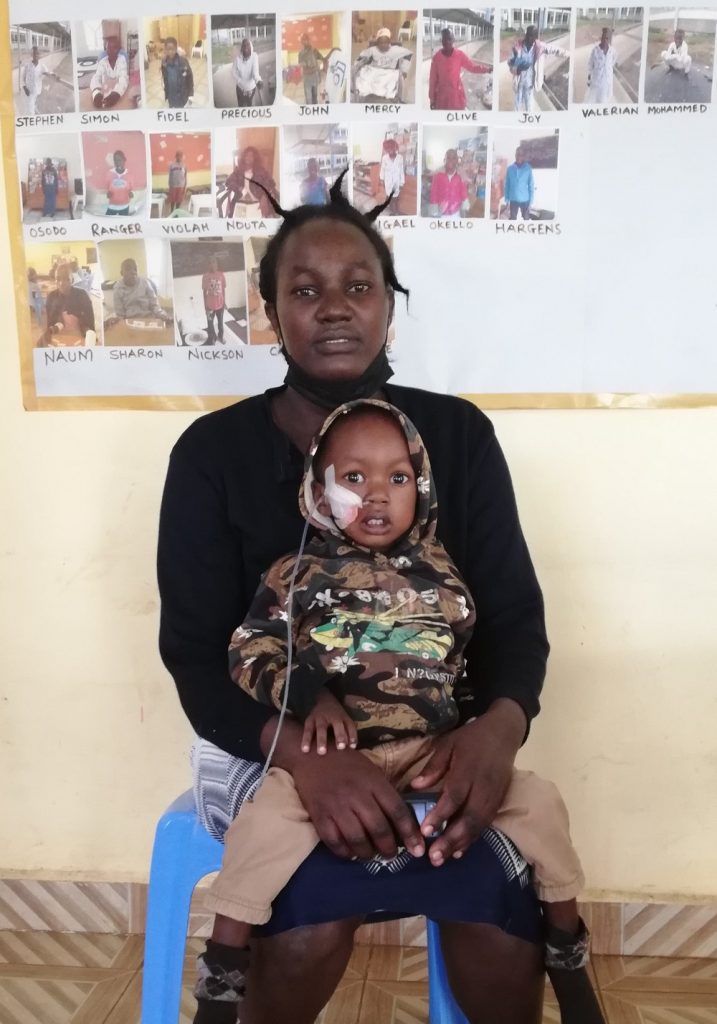
Kiplang’at, the Marathoner
Brian Kiplang’at, a patient at our hospital, comes from the same community as Eliud Kipchoge. Brian has a burning love for athletics, specifically the long races like Kipchoge.
At only 13 years of age, he has competed for his school at the county and extra-country races and emerged at the top. The boy is a Kipchoge diehard and like the marathoner, he believes in the power of discipline. Reciting one of the world marathoner’s quote, he says, “I believe that only the disciplined ones in life are free. If you are undisciplined, you are a slave to your moods and your passions.” Kiplang’at says that this quote is now a life principle he holds dear and with it, hopes to accomplish greater things, including beating his idol’s 1:59 marathon record. Sadly his ambitions and dreams came to a grinding halt one night.
One Thursday evening in September this year, Kiplang’at got home from school, exhausted. He says that as usual, he hugged his mother and went ahead to have a change of clothes so that he could wash the school uniform in readiness for Friday. As he greeted his mom, he complained about the excruciating pain he felt on one of his left leg toes. The mom collected some herbs and had him drink. On Friday, he went to school.
However, the pain grew stronger by the minute. By the end of the day, he could no longer withstand the pain, so he was taken to a dispensary around their home. Nothing improved even with the painkillers he was given. On Saturday, “my mom took me to a County Referral Hospital where tests were done,” Kiplang’at said. The results were quite unexpected to the doctors, who then felt that the tests needed to be rerun, hence Kiplang’at’s referral to a bigger facility. The receiving hospital ran the tests on Sunday, explained the results to the family, and moved on to amputate his leg from halfway down through his left thigh.
Kiplang’at says that the doctors emphasized that every minute was very crucial to his survival as the clot that had led to the pains was moving rather quick towards the heart and may not be easy to manage once it gets there. After the surgical operation, Kiplang’at rested on Monday as his records were drawn in preparation for transfer to our facility.
Early morning of Tuesday, Kiplang’at, his uncle, and his mom arrived at our facility. His received emergency services and was moved to Tumaini where he was set up for a couple of days. Upon conclusive tests in liaison with the referring hospitals, Kiplang’at’s mom and uncle were informed that he had Acute Myeloid Leukemia, a form of cancer that starts in the bone marrow and quickly moves to the blood and other body parts.
Kiplang’at’s uncle, Weldon Terer, who sat with us throughout the interview, says that what he saw of his nephew’s mom was the weakest he had ever seen of her. Luckily, Dr. Odongo, a doctor in our Oncology department, took his time to console them after informing them. “He had counseled us for a bit before proceeding to break the news. His comforting words enabled us to believe that our boy would be well even when it was very difficult to think so,” said Terer.
Hardly 2 months later, Dr. Odongo’s words appear to make more sense than they could believe before. “With the constant tabs Daktari (doctor) has kept on Kiplang’at, our son has cleared his first treatment cycle and received his discharge consent a few days ago,” said Terer. “I am very excited that I get to go back home to Cherono and Kipkurui, my brother and sister whom I miss dearly,” followed Kiplang’at.
As you see from his attire in the pictures, Kiplang’at is also an Arsenal FC fan and he misses the adrenaline from when he watches his favorite player and striker, Pierre-Emerick Aubameyang, whom Kiplang’at refers to as Auba. These soccer moments he spends with his other uncle, Emmanuel, with whom he likes to watch matches, are something he more than craves. With the discharge, he will finally be able to watch his favorite team play, as soon as this Sunday as Arsenal will be playing against Liverpool FC.
As we spoke, he could not help but feel a sense of relief that he gets to experience that adrenaline soon, along with all of home’s blisses, despite his leg’s new ‘normal.’ While Kiplang’at is yet to make peace with the fact that he might not be running again, he believes that he might have a career in soccer as a commentator. He could be very great at it considering his good mastery of language and his desire to excel. As he gets used to his normal life we will introduce the idea of the Paralympics to the boy, and a Kenyan living in America, Marko Cheseto, who is making great strides in that arena proving that a disability in not an inability.
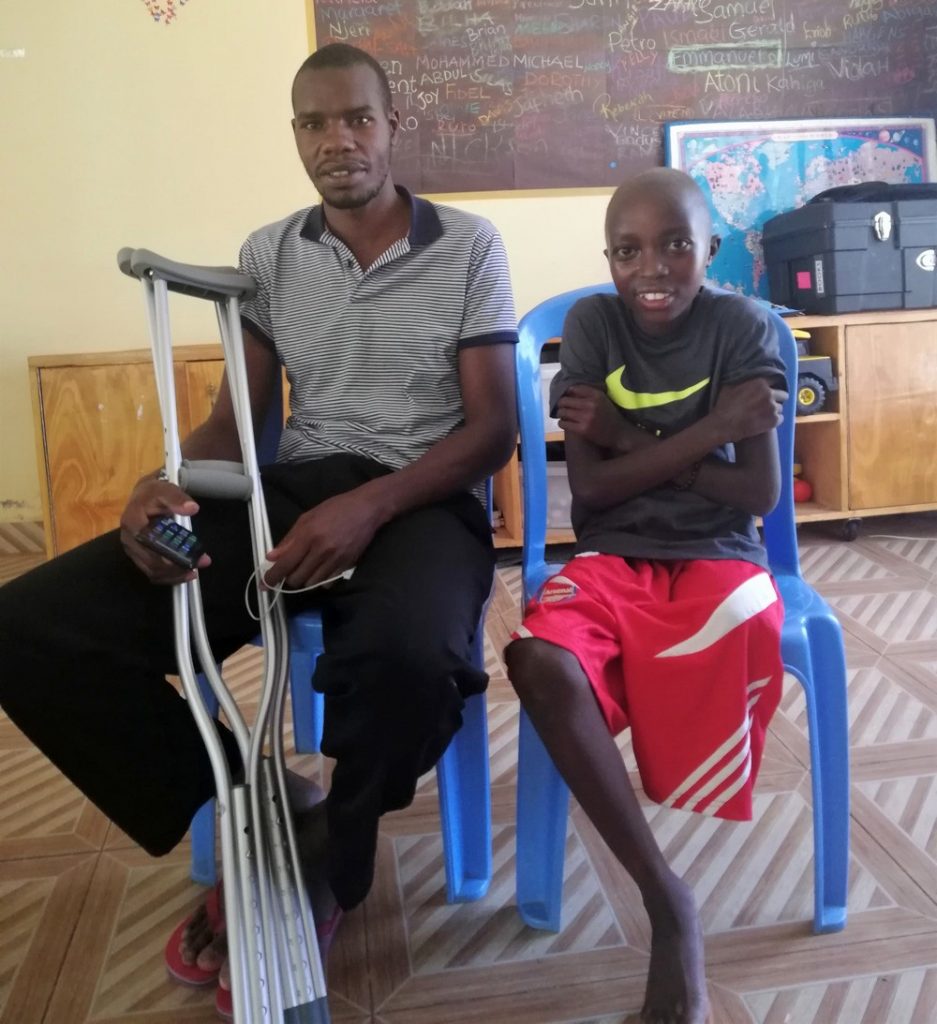
Ann Macia
Coming to Eldoret, Ivy was bubbling with excitement. Finally, in the big city (Eldoret’s pop is 467,000) maybe the young mother could secure a job. She did not have any qualifications to fall back on, and schooling had not been the best before her pregnancy, but surely, she could secure a job as a nanny, looking after little kids because that is what she excelled in, and had the interest for.
The new dwellings were, in a word, rundown, but lacking money what could Ivy do? She, and her 11-month-old daughter Ann Macia, moved in as a temporary measure. When the funds came, she would upgrade, but she recalled that old saying, ‘Beggars can’t be choosers.’
Unfortunately, the walls, for want of renovation, let a cold breeze in, and Eldoret sits at an altitude of 2000m making the nights cold. Eldoret maybe dubbed the City of Champions for runners, but runners like the cool air for training. At once the baby started to develop a worrying cough. Ivy was not concerned, she knew it was common, but after three days Ann Macia was feinting, sporadically stopping breathing and mom realized something was very serious. Being a newcomer to Eldoret she asked a neighbor, “Where can I take a sick child? Not a private hospital?” She was instructed to come to us, “You need to go to the best, but it is a public hospital, don’t worry. It is called Shoe!”
So Ivy arrived, and like our story last week, the child was diagnosed with pneumonia. Nurse Nyamongo took over and told Ivy, not to worry, with the proper treatment her child would be back to full health shortly. In fact, on the day we take this interview, if we peer out of the window, on the astroturf lawn where every day there is exercise and football, we can see baby Ann Macia crawling around the field giggling about something that seems to amuse her. She’ll stay with us for a few more days, then be sent home and hopefully by that time the landlord will have patched up the drafty apartment…and Ivy will find some work as a nanny.
